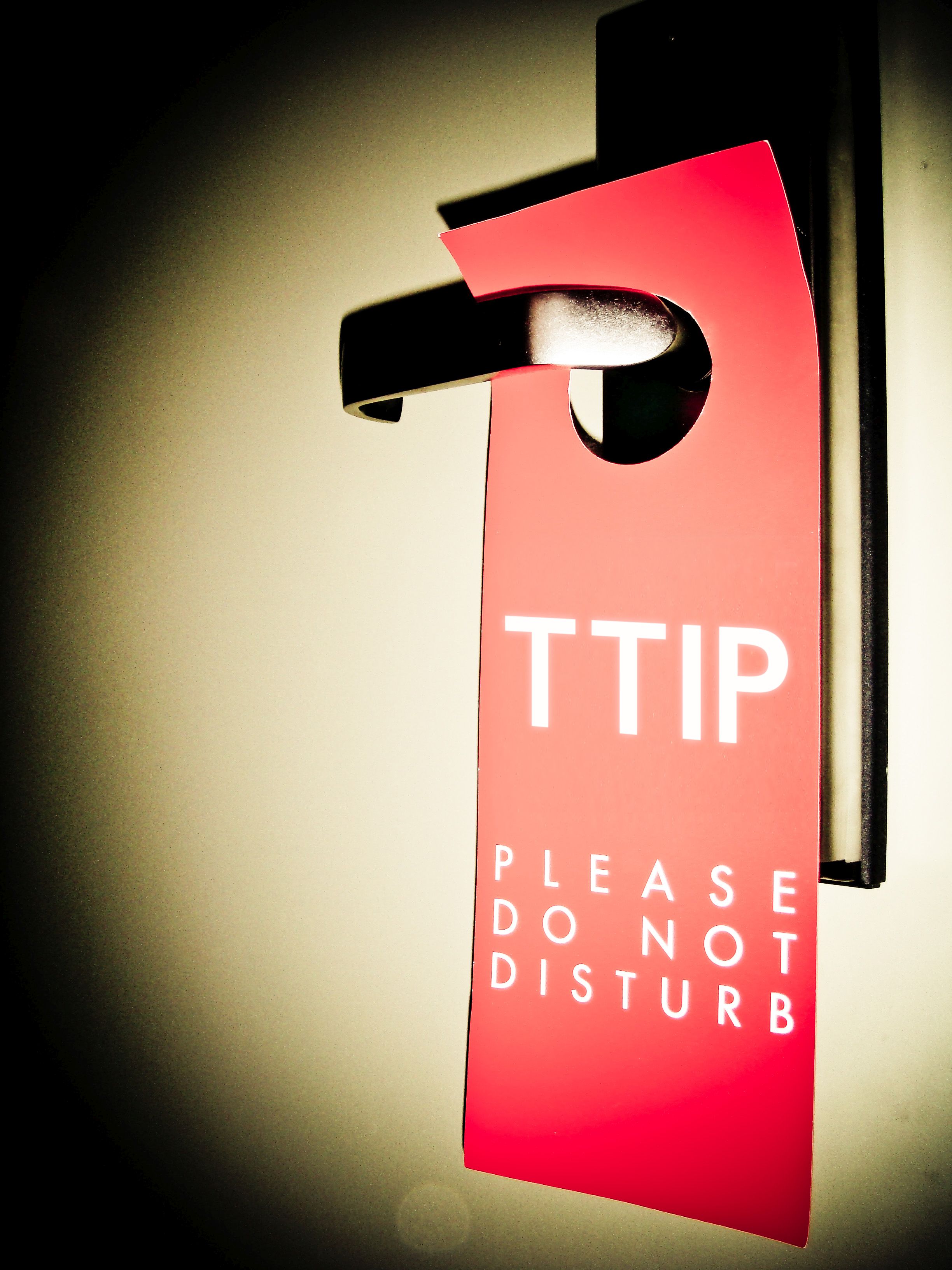90,000 protesters in Hanover (Germany) expressed their displeasure and discomfort with the secret negotiations about TTIP and CETA, when Obama visited the city in April. 250,000 had preceded them last October in Berlin. Meanwhile more than 3.45 million people have signed the online petition Stop TTIP – I am one of them. On Monday, 2 May TTIP leaks confirmed many of our concerns.
The whole negotiation process has come under heavy pressure, which made even the leadership of the German Social Democrats try to be on the winning side, even though until then they had played quite an unfortunate, almost tragic role in the German debate. Sigmar Gabriel, party leader and vice-Chancellor, who had taken a rather, shall we say, unsteady position towards TTIP (pushing for TTIP negotiations and emphasising its rather uncertain benefits) suddenly talks about red lines, which must not be crossed. Only in October last year during the World Economic Forum in Davos he had offended his (potential) voters by saying that TTIP had a difficult stand in Germany because it was a ‘rich and hysterical’ country. So why should your rich and hysterical fellow-country(wo)men trust you now, Mr Gabriel?
In this post I will try to debunk some of the myths about TTIP and its opponents. One myth is that the opposition against TTIP/CETA is nothing else but anti-Americanism in disguise. The organisers of the demonstration in Hanover made it crystal clear in their speeches and leaflets that the demonstration was not directed against the U.S. and that everyone with an anti-American agenda should leave the demonstration. I cannot speak for all demonstrators, but as I was there I could witness that the vast majority was not against the U.S. per se, but against the undemocratic negotiation process; the protesters were also united in their criticism of several points of TTIP/CETA. So it seems to me that accusing anti-TTIP protesters of anti-Americanism is a smoke screen rather than a valid argument. It is used to discredit the messenger (the protesters) in order to devaluate their point of view, which is a widely used tactic, whenever it is difficult to rebut the argument itself.
Another widely-used argument against the protesters is that their opposition is based on fear. It is true that the people who demonstrate are afraid of CETA and TTIP, but this fear is mainly caused by the secrecy of the negotiations. Lack of information creates uncertainty and uncertainty then again produces fear, especially if it concerns important areas of an individual’s life. So it is those who block information and prevent a sound public debate who create fear; a fear which would not exist if there had been more transparency in the first place. Blaming TTIP opponents for a fear which is caused by the secrecy surrounding the negotiations is, in fact, perverse.
It is a shame that the TTIP leaks were necessary to provoke a hopefully more substantiated public debate on TTIP. TTIP supporters have reacted by playing down the relevance of the leaks. According to them nothing new has been revealed and only an excerpt from the negotiations was published which does not contain the final wording of the negotiated text. It is true that the TTIP leaks show us a snapshot rather than the whole picture, but it is also true that they offer us a glimpse into how contrary the views and approaches of the EU and the U.S. are. For instance, according to the leaks the U.S. side is trying to trade facilitations for the European car industry against tariff concessions for the U.S. agriculture industry. This kind of ‘dirty deals’ is exactly what citizens on both sides of the Atlantic are criticising. Another example is investor protection. The TTIP leaks suggest that the EU proposal for an international trade tribunal is widely ignored by the U.S. The U.S. envoys only promised to review the proposal on this issue, which basically means a standstill of the negotiations.
If we look at central issues like food safety, animal and environmental protection, the leaks provide us with a sense of how two very different cultures clash: the US science-based principle against the European precautionary principle. Obviously, the two do not match. The U.S. proposal is based on the idea that the harmfulness of a product has to be verified to evoke a ban, while under the precautionary principle already the risk to harm people or the environment can block a product (‘better safe than sorry’). In short, the TTIP leaks do not only reveal something new, but ‘the reality of the TTIP negotiations even exceeds our misgivings’( Heribert Prantl, head of the domestic policy department at Süddeutsche Zeitung).
Another argument put forward by TTIP-supporters is that many trade agreements already exist, which is true, but this does not tell us anything about the benefits which trade agreements have or do not have for the people. The North American Free Trade Agreement (NAFTA) has been a blueprint for other trade agreements. To compare different economies in order to predict the outcome for another trade agreement is flawed, but it can give us a hint about the mechanisms of trade agreements. The German documentary Wohlstand für alle (‘welfare for all’, ARD 10 February 2016) tries to investigate the effect of NAFTA on the citizens of the three partner countries and their working and living environment, and it tries to anticipate what TTIPs will mean for European citizens. Professor Max Otte, an expert on trade agreements, warns in this documentary that ‘free trade’ is an ideological term: ‘free trade is not bad […], but the term hides more than it reveals.’ It is important to ask ‘who trades freely, who benefits and who maybe needs protection? This is hidden by the euphemistic term ‘free trade.’ He also believes that in the TTIP negotiations the U.S. position will prevail.
Lauri Wallach, director of Public Citizen’s Global Trade Watch (a consumer protection organisation), also an expert on trade agreements, is one of the strongest TTIP adversaries in the U.S. After 20 years of research into NAFTA, her conclusion is devastating: ‘We have experienced that everything came true what critics have predicted, but much worse.’ Detroit and the ‘rust belt’ are a warning for what NAFTA has destroyed and not created. 100,000s of jobs were transferred to Mexico to evade trade unions and higher wages.
Stronger competition for workers and a race to the bottom concerning wages and workers rights have to be anticipated, especially in Europe, Otte says, as the U.S. has already been through this development due to NAFTA. It is not far-fetched to believe that TTIP will also result in an even wider gap between rich and poor, as was the case in Mexico. Mexican workers did not benefit much from NAFTA, as NAFTA only created low-paid jobs at the U.S. border, with fewer workers rights and less protection. Is this what we want for Europe?
In the beginning Wallach believed that TTIP could bring ‘European workers’ rights, environmental- and food standards, as well as data protection’ to the U.S. Unfortunately, this will not happen, she thinks now, as TTIP will only serve the large industry and international corporations in Europe and the U.S. making it easier for them to operate in both economic spaces.
With NAFTA in mind, we should also read the studies on the possible gains of TTIP very carefully. There are many (controversial) studies you could read, but required reading should be the study of the Centre for Economic Policy Research (CEPR) Reducing Transatlantic Barriers to Trade and Investment- An Economic Assessment which had been requested by the European Commission itself. In 2014 Karel De Gucht, the predecessor of Cecilia Malmström as Commissioner for Trade was interviewed in the documentary TTIP Der Große Deal (TTIP The Big Deal). There he argued that TTIP will bring 100,000s of jobs. Confronted with the results of the Commission study, which predicts only 0.05 percent growth per year for whole Europe and a tenth of the amount of jobs de Gucht had predicted, he had to withdraw his statement publicly. The same happened to the Bundesverband Deutscher Industrie (BDI), the lobby group of the German Industry and other organisations such as Die Initiative Soziale Marktwirtschaft (Initiative Social Market Economy, INSM) and Der Verband der Automobilindustrie (The German Car Industry, VDA), all of which had to admit to mistakes and misinformation on their homepage and in publications. Only the German Christian-Democratic Party (CDU) did and still does not admit that the estimates De Gucht and others used are wrong. Just recently the CDU tabled a motion in the parliament of Lower Saxony, stating that TTIP will bring 0.5 percent growth per year, an estimate which in the meantime has been proven wrong. Ignorance or a deliberate attempt to pull the wool over people’s eyes? Who knows, but neither is politically acceptable.
Is TTIP a danger for our democracies? A contentious issue is the question of investor-state dispute settlement (ISDS). This is a thorn in the side for many critics as it is additional jurisdiction which gives extra rights to large companies. Even the light version of ISDS grants special rights to companies, which is not only unnecessary but also dangerous for democracies. Unnecessary, because two developed and democratic areas, the USA and Europe, do not need that kind of protection for their companies; dangerous, because such additional jurisdiction benefit economic interests over rules and laws developed in a political discourse by elected representatives. ISDS, which is usually held in secret and is not a permanent tribunal, would restrict democratic decisions and the supremacy of politics over economy. I may not be a legal expert, but even the German Association of Judges (Deutscher Richterbund, DRB) expressed their opposition against ISDS in November 2015:
‘The DRB does not see the legal basis or the necessity for such a court.’ Furthermore, the DRB ‘asks the German and European legislator […] to reduce the use of arbitrational procedures in international investor protection as far as possible.’ That is a sound statement which needs no further clarification.
An even greater danger for our democracies is the proposed ‘living agreement’, which includes the concept of Regulatory Cooperation. Living agreement means that the agreement will be developed continuously, after it is ratified. The innocent term ‘Regulatory Cooperation’ is the central pillar of that idea, which implies that a committee consisting of mainly business representatives is set up. This committee would have access to draft legislation before the public or possibly even parliamentarians do. In an early stage this Regulatory Committee could water down legislation which it considers detrimental for business interests. Possibly it could even prevent legislation which would be beneficial for society, environment or workers. All this would result in more economic liberalisation. Regulatory Cooperation in its strongest form would take much of the power to actively create and define the principles of our society away from politics and at best would reduce politics to a simple management of the status quo. Going beyond the current status quo would become very difficult, if not impossible.
Much more could be said about the false promise of ‘free trade’, but the criticism and concerns I summerised earlier should advise us to abandon TTIP in its current form. This TTIP has to be stopped to protect our democracies. What we need is more democracy, transparency and fewer back-door-deals. Again, this is not about EU vs. U.S., it is about ordinary citizens, workers and most of small and medium-sized businesses (SMBs) vs. big businesses on both sides of the ocean. It is about democratic values and rights vs. an excessive influence of a mighty minority.
You can download the article in PDF here.
Daniel Lüchow (1988) is from Germany and graduated in European Studies from the University of Hanover. He currently works for a Green member of the Lower Saxony State Parliament.


